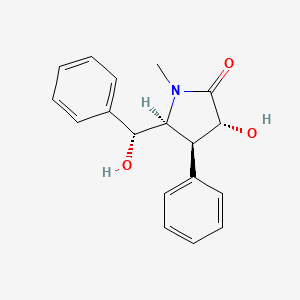Ferroptosis-centered Drug Response Information
General Information of the Drug (ID: ferrodrug0337)
| Name |
Clausenamide
|
||||
|---|---|---|---|---|---|
| Synonyms |
Clausenamide; 103541-15-7; (+)-Clausenamide; 109905-95-5; (-)-Clausenamide; (3R,4S,5S)-3-hydroxy-5-[(R)-hydroxy(phenyl)methyl]-1-methyl-4-phenylpyrrolidin-2-one; 3-hydroxy-5-[hydroxy(phenyl)methyl]-1-methyl-4-phenylpyrrolidin-2-one; ( )-Clausenamide; (3R,4S,5S)-3-Hydroxy-5-((R)-hydroxyphenylmethyl)-1-methyl-4-phenylpyrrolidin-2-one; (3R,4S,5S)-3-HYDROXY-5-[(R)-HYDROXY-PHENYL-METHYL]-1-METHYL-4-PHENYL-P YRROLIDIN-2-ONE; Zetaclausenamide; CHEMBL508970; SCHEMBL6369855; DTXSID10908462; 2-Pyrrolidinone,3-hydroxy-5-((R)-hydroxyphenylmethyl)-1-methyl-4-phenyl-, (3R,4S,5S)-rel; DL-Xylonic acid, 3,4-dideoxy-4-(methylamino)-3-phenyl-5-C-phenyl-, gamma-lactam, (S*)-
Click to Show/Hide
|
||||
| Structure |
 |
||||
| Formula |
C18H19NO3
|
||||
| IUPAC Name |
(3R,4S,5S)-3-hydroxy-5-[(R)-hydroxy(phenyl)methyl]-1-methyl-4-phenylpyrrolidin-2-one
|
||||
| Canonical SMILES |
CN1C(C(C(C1=O)O)C2=CC=CC=C2)C(C3=CC=CC=C3)O
|
||||
| InChI |
InChI=1S/C18H19NO3/c1-19-15(16(20)13-10-6-3-7-11-13)14(17(21)18(19)22)12-8-4-2-5-9-12/h2-11,14-17,20-21H,1H3/t14-,15-,16+,17+/m0/s1
|
||||
| InChIKey |
WGYGSZOQGYRGIP-MWDXBVQZSA-N
|
||||
| PubChem CID | |||||
Full List of Ferroptosis Target Related to This Drug
Nuclear factor erythroid 2-related factor 2 (NFE2L2)
| In total 1 item(s) under this Target | |||||
| Experiment 1 Reporting the Ferroptosis-centered Drug Act on This Target | [1] | ||||
| Target for Ferroptosis | Marker/Suppressor | ||||
| Responsed Disease | Injury of intra-abdominal organs | ICD-11: NB91 | |||
| Responsed Regulator | Kelch-like ECH-associated protein 1 (KEAP1) | Driver | |||
| Pathway Response | Fatty acid metabolism | hsa01212 | |||
| Ferroptosis | hsa04216 | ||||
| Pathways in cancer | hsa05200 | ||||
| Cell Process | Cell ferroptosis | ||||
| In Vitro Model | HepaRG cells | Hepatocellular carcinoma | Homo sapiens | CVCL_9720 | |
| SMMC-7721 cells | Endocervical adenocarcinoma | Homo sapiens | CVCL_0534 | ||
| Hep-G2 cells | Hepatoblastoma | Homo sapiens | CVCL_0027 | ||
| BEL-7402 cells | Endocervical adenocarcinoma | Homo sapiens | CVCL_5492 | ||
| In Vivo Model |
Male C57BL/6 mice aged 8-10 weeks were purchased from Guangdong Experimental Animal Center (Guangzhou, China). The animals were maintained on a 12 h light-dark cycle in a regulated temperature and humidity environment for 1 week before drug administration. (+)-CLA (50 mg/kg/day, i.g.) or fer-1 (2.5 umol/kg/day, i.p.)were administered for 7 consecutive days. To induce liver injury, mice were injected with erastin (100 mg/kg/day, i.p., twice a day) on both the 6th and 7th day, or a single dose of APAP (600 mg/kg/day, i.p.) on the 7th day after overnight food deprivation. The serum and livers were obtained for analysis.
Click to Show/Hide
|
||||
| Response regulation | (+)-clausenamide ((+)-CLA) specifically reacted with the Cys-151 residue of Keap1, which blocked Nrf2 ubiquitylation and resulted in an increased Nrf2 stability. Thus, (+)-CLA protects against acetaminophen-induced hepatotoxicity via inhibiting ferroptosis and activating the Keap1/Nrf2 pathway in a Cys-151-dependent manner. | ||||
